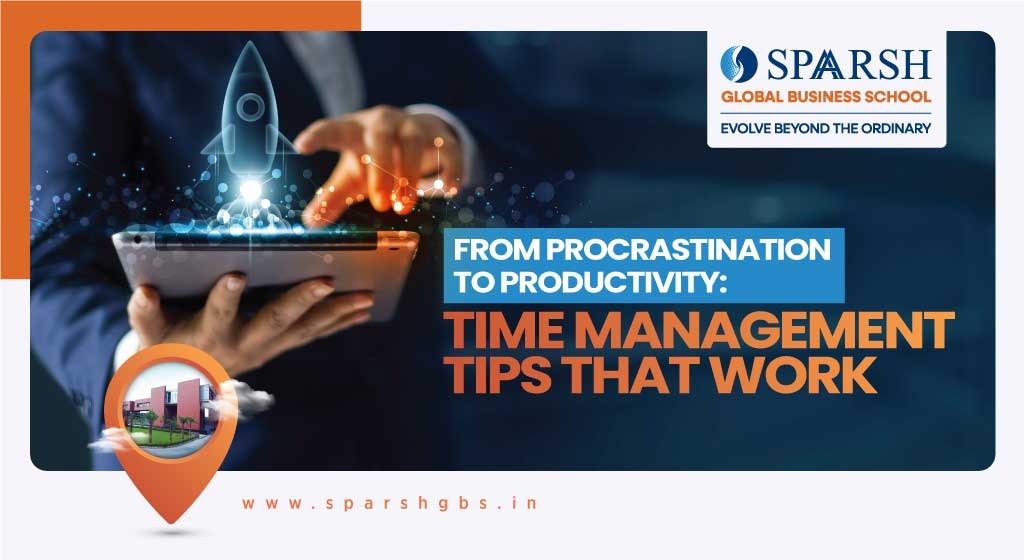
Among various skills and competencies, efficient time management is perhaps one of the most critical factors for effective learning in the evolving field of business education. The ability to translate work priorities and minimise distractions enables a candidate to not only perform well in business school, but throughout life and career. There is no doubt that time management continues to be one of the most challenging skills that students and even professionals have to deal with. Indeed, many great ideas can be undermined by such factors as procrastination. However, students can always avert being paralysed by procrastination and change behaviours that lead to higher students productivity through the use of these strategies.
Understanding Procrastination: The Enemy of Productivity
Sometimes, people misunderstand procrastination as a simple case of sluggishness or a lack of self-control. Psychological factors such as fear of failure, perfectionism, and lack of motivation complicate the situation. Stress from academics, social pressures and career possibilities can make procrastination practically inevitable for PGDM students.
The consequences of procrastination are extensive. Anxiety and stress perpetuate a vicious cycle that reduces efficiency even further, leading to last-minute panicking, poor quality and missed deadlines. To break free from this loop, it takes intentional effort to understand the underlying causes of procrastination and put into practice efficient time management techniques.
Effective Time Management Strategies
1. Prioritise Tasks with the Eisenhower Matrix
The Eisenhower Matrix, alternatively referred to as the Urgent-Important Matrix, is a potent instrument for the establishment of task priorities. This system classifies tasks into four quadrants:
• Urgent and Important: Tasks that demand immediate, focused attention.
• Important but Not Urgent: Tasks that are critical for achieving long-term goals but do not require immediate attention.
• Urgent but Not Important: Tasks requiring immediate attention but lacking criticality for long-term efficiency.
• Not Urgent and Not Important: Items that serve as distractions or low-priority activities.
The Eisenhower Matrix enables PGDM students to concentrate their efforts on high-impact activities, therefore mitigating the inclination to delay the completion of crucial assignments.
2. Adopt the Pomodoro Technique
The Pomodoro Technique is a well-known time management technique that organises focused work in short intervals of, say, 25 minutes, followed by a break. In this method, the brain's ability to focus for a few minutes is utilised to overcome the exhaustion that leads to procrastination. Students in business courses with many classes and responsibilities may find the Pomodoro Technique to be of benefit in maintaining consistent work with minimal stress.
3. Set SMART Goals
Everyone has experienced situations in life where we need to achieve things on time; so goals should be set for efficient time management. However, one has to understand that not all goals are of the same importance or usefulness. The SMART system of Specific – Measurable– Achievable – Relevant – Time bound ensures that objectives are clear and attainable. For instance, instead of having generic goals like ‘to study for exams’ the SMART goal would be ‘to complete a review of three chapters of the marketing textbook by Friday.’ This way, it is easy to track progress and keep energy levels up.
4. Eliminate Distractions
In the present era of technology, potential sources of disturbance are ubiquitous, ranging from notifications on social media platforms to email and chats on various platforms. For students studying business, these distractions can be especially distracting during study sessions or while engaged in time-bound assignment work. To address this issue, it is crucial to provide an environment devoid of distractions. This could entail disabling notifications by using applications stored on your phone to prevent access to distracting digital interferences and by establishing specific periods for checking emails and messages.
5. Practise Self-Compassion
Finally, it is essential to admit that the pursuit of perfection can become a significant challenge and a hindrance to efficiency. Many business students delay their work because they fear that they will not be able to meet the challenging requirements of their class. The cultivation of self-compassion that acknowledges the possibility of making errors, and that improvement occurs step by step, can reduce the expectations of perfect performance and facilitate the creation of better working habits.
Conclusion
Time management not only consists of compressing more effective work in a day, but it encompasses becoming more efficient and smarter in your work. Sparsh Global Business School helps students improve their procrastination by identifying the following effective strategies which include; work prioritisation, the Pomodoro technique, setting up smart goals, minimisation of distractions and self-care. With these resources and the support of Sparsh Global Business School, students can reach their academic goals and master time management skills necessary for personal success in their future careers.
FAQ’s
1. Why is time management important in business schools?
Business students need time management to prioritise activities, reduce distractions and stay productive. Effective time management helps students avoid procrastination, manage various tasks and succeed academically and professionally.



